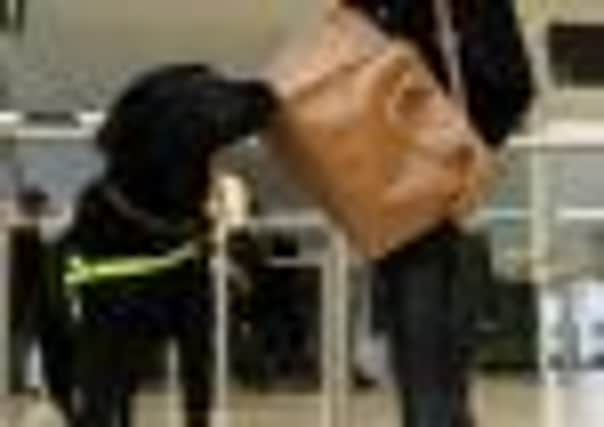Prisons look to deploy more sniffer dog squads


Bosses plan to expand the number of dog units at jails across the country, including Saughton Prison, to track down drugs, mobile phones, knives and other contraband smuggled in to inmates.
Officers are looking for traditional working dogs, such as spaniels, labradors and retrievers, to join the team and are encouraging breeders to get in touch with the service, which will train them in-house.
Advertisement
Hide AdAdvertisement
Hide AdConvicts have come up with increasingly inventive ways of getting banned goods into prisons, including behind postage stamps, sewn into clothes and via parcels thrown over prison walls. Tom Fox, head of corporate affairs at the Scottish Prison Service, said the recruitment drive would help them snare more illegal and banned items in jails than ever before.
He said: “We’re looking for quite a few dogs, over a dozen across the service, and working dogs such as Labs and spaniels are ideal as they’re bred for a working environment.
“While we still have a national dog unit, and in the past we’ve had handlers going round prison estates, now we have increased the number of dog units at various locations.
“The dogs are there on a permanent basis, but they will be available elsewhere if needed.
Advertisement
Hide AdAdvertisement
Hide AdHe added: “The dogs are part of a general push to improve security in jail, and they will target drugs, mobile phones and other illegal substances.
“They’re particularly useful when it comes to identifying contraband, and are used well in conjunction with new technology and intelligence.”
As well as targeted and random spot checks on prisoners, Mr Fox explained that they would act as a deterrent to those who seek to supply items to loved ones in prison.
He said: “We also use them as passive indicators, so when people are coming into jails we can determine whether they have been in contact with illegal substances.
Advertisement
Hide AdAdvertisement
Hide Ad“They also serve as a very effective deterrent. When people see them they suddenly decide they’ve left something in the car.
“Previously we had dog units to go around the jails and arrive unannounced. Now we have dogs located at a number of our key establishments.
“After this drive we may build the number up even more in future.”
Mr Fox said that there was a waiting list for their retired working dogs, which he said make popular pets because of their strict training.
Advertisement
Hide AdAdvertisement
Hide AdHe said: “They’re very good dogs and well trained, so there is a waiting list. The dogs have a limited working life, as all working dogs do, but they make excellent pets afterwards. It takes a while to get one.”
In recent years other initiatives have proven a success, including a Neighbourhood Watch-style scheme, which asks residents living near the jail to flag up any suspicious activity. The programme, called Prison Watch, saw a 76 per cent drop in items being thrown over jail walls.